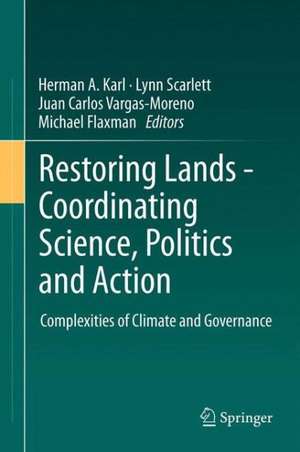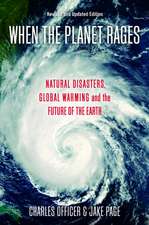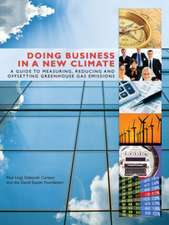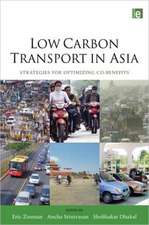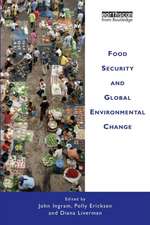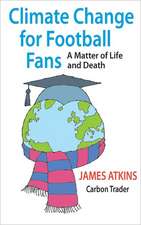Restoring Lands - Coordinating Science, Politics and Action: Complexities of Climate and Governance
Editat de Herman Karl, Lynn Scarlett, Juan Carlos Vargas-Moreno, Michael Flaxmanen Limba Engleză Paperback – 13 apr 2014
From the pre-publication reviews:
“Finally, we have a book that explains how science is irrelevant without people. It’s people who decide when and how to use science, not scientists. This book gives us a roadmap for how to really solve complex problems. It involves hard work, and creating new relationships between scientists and the public that don’t typically exist in our society.”
-John M. Hagan, Ph.D.
President, Manomet Center forConservation Sciences
| Toate formatele și edițiile | Preț | Express |
|---|---|---|
| Paperback (1) | 956.81 lei 6-8 săpt. | |
| SPRINGER NETHERLANDS – 13 apr 2014 | 956.81 lei 6-8 săpt. | |
| Hardback (1) | 961.55 lei 6-8 săpt. | |
| SPRINGER NETHERLANDS – 5 feb 2012 | 961.55 lei 6-8 săpt. |
Preț: 956.81 lei
Preț vechi: 1166.84 lei
-18% Nou
Puncte Express: 1435
Preț estimativ în valută:
183.08€ • 191.67$ • 151.49£
183.08€ • 191.67$ • 151.49£
Carte tipărită la comandă
Livrare economică 05-19 aprilie
Preluare comenzi: 021 569.72.76
Specificații
ISBN-13: 9789401785204
ISBN-10: 9401785201
Pagini: 556
Ilustrații: XVI, 540 p.
Dimensiuni: 155 x 235 x 29 mm
Greutate: 0.77 kg
Ediția:2012
Editura: SPRINGER NETHERLANDS
Colecția Springer
Locul publicării:Dordrecht, Netherlands
ISBN-10: 9401785201
Pagini: 556
Ilustrații: XVI, 540 p.
Dimensiuni: 155 x 235 x 29 mm
Greutate: 0.77 kg
Ediția:2012
Editura: SPRINGER NETHERLANDS
Colecția Springer
Locul publicării:Dordrecht, Netherlands
Public țintă
ResearchCuprins
Acknowledgements.- Preface.- Introduction: Chapter 1 Restoring and Sustaining Lands—Coordinating Science, Politics, and Communities for Action, by Karl, Scarlett, Vargas-Moreno, and Flaxman.- Section One—Science, Technology, and Engineering (Tools and Methods): Chapter 2 Section Introduction, by Flaxman and Vargas-Moreno.- Chapter 3: Participatory Climate Change Scenario and Simulation Modeling: Exploring Future Conservation Challenges in the Greater Everglades Landscape, by Vargas-Moreno and Flaxman.- Chapter 4 Using "Spatial Resilience Planning" to Test Climate-Adaptive Conservation Strategies, by Flaxman and Vargas-Moreno.- Chapter 5: Cities and Integrated Water Planning: Complexities of Climate Change, by Kirshen and others.- Chapter 6 Collaborative Modeling: Institutional Complexities, by Barreteau and others; Chapter 7 Challenge of Integrating Natural and Social Sciences to Better Inform Decisions: A Novel Proposal Review Process, by Matso.- Section Two—Politics and Policy (Governance and Frameworks): Chapter 8 Section Introduction, by Scarlett; Chapter 9 Transcending Boundaries: The Emergence of Conservation Networks, by Scarlett.- Chapter 10 Managing the Science-Policy Interface in a Complex and Contentious World, by Beratan and Karl.- Chapter 11 Deliberative Democratic Governance to Foster Sustainability, by Merad.- Chapter 12 Values in Natural Resource Management and Policy, by Mattson and others.- Chapter 13 Flow in the Everglades: The Game Inside the Game, by Light.- Chapter 14 Framing an Uncertain Climate: Adaptation and Water Management Practice in the Netherlands, by Hogendorn, Laws, and Petersen.- Chapter 15 Adapting to Changing Climate: Exploring the Role of the Neighborhood, by Karl and others.- Section Three—People and Action (Implementation and Stewardship): Chapter 16 Section Introduction, by Karl.- Chapter 17 Community-based Ecological Stewardship—AConcept for Productive Harmony on the Public Lands of the Western United States, by McVicker.- Chapter 18 Thoughts on How to Implement Citizen Based Ecosystem Stewardship from 32 Years in Governance, by Whitley.- Chapter 19 Climate Change and the Language of Geographic Place, by Kent and Preister.- Chapter 20 Tomales Bay Watershed Council: Model of Collective Action, by Pileggi and others.- Chapter 21 Outcomes of social-ecological experiments in near-shore marine environments: cognitive interpretation of the impact of changes in fishing gear type on ecosystem form and function, by Curtin and Hammitt.- Synthesis: Chapter 22 Synthesis: Developing the institutions to coordinate science, politics, and communities for action to restore and sustain lands, by Karl, Scarlett, Vargas-Moreno, Flaxman.
Notă biografică
Herman Karl is a U.S. Geological Survey Research Scientist and Visiting Lecturer in the Department of Urban Studies and Planning; he co-directs the MIT-USGS Science Impact Collaborative (MUSIC). During his thirty-year career at USGS, Dr. Karl has developed and led many projects to collect scientific information to inform policy decisions. He was a chief scientist of the EEZ-Scan project. EEZ-Scan project teams mapped the entire U.S. Exclusive Economic Zone and provided data in planning for environmental and resource management of this zone. He received the U.S. Department of the Interior Superior Service Award for his leadership of the EEZ-Scan project. He initiated and led the Gulf of the Farallones project, which conducted research on the effects of radioactive waste dumped off the San Francisco Bay area. The book summarizing this research won the Association of Earth Science Editors Award for Outstanding Publication of 2003 and two other national awards. His work was used in testimony to Congress. Dr. Karl was one of several chief scientists directing research gathering information on DDT-contaminated sediment offshore the southern California coast. This research was in support of the Montrose Case, the single largest environmental lawsuit at the time. Dr. Karl was one of the government expert witnesses in this case; the government won the lawsuit. For several years, he was part of the instructor core in the U.S. Bureau of Land Management Community Based Ecosystem Steward course. The course was given at the request of land managers at sites of some of the most contentious environmental issues in the Nation, such as the spotted owl/timber harvest controversy. USGS located Dr. Karl at MIT to continue to develop ways to more effectively utilize science to inform policy. Before coming to MIT, he was Chief Scientist of the USGS Western Geographic Science Center.
Textul de pe ultima copertă
Environmental issues, vast and varied in their details, unfold at the confluence of people and place. They present complexities in their biophysical details, their scope and scale, and the dynamic character of human action and natural systems. Addressing environmental issues often invokes tensions among battling interests and competing priorities. Air and water pollution, the effects of climate change, ecosystem transformations—these and other environmental issues involve scientific, social, economic, and institutional challenges. This book analyzes why tackling many of these problems is so difficult and why sustainability involves more than adoption of greener, cleaner technologies. Sustainability, as discussed in this book, involves knowledge flows and collaborative decision processes that integrate scientific and technological methods and tools, political and governance structures and regimes, and social and community values. The authors synthesize a holistic and adaptive approach to rethinking the framework for restoring healthy ecosystems that are the foundation for thriving communities and dynamic economies. This approach is that of collective action. Through their research and practical experiences, the authors have learned that much wisdom resides among diverse people in diverse communities. New collaborative decision-making institutions must reflect that diversity and tap into its wisdom while also strengthening linkages among scientists and decision makers.
From the pre-publication reviews:
“Finally, we have a book that explains how science is irrelevant without people. It’s people who decide when and how to use science, not scientists. This book gives us a roadmap for how to really solve complex problems. It involves hard work, and creating new relationships between scientists and the public that don’t typicallyexist in our society.”
-John M. Hagan, Ph.D.
President, Manomet Center for Conservation Sciences
From the pre-publication reviews:
“Finally, we have a book that explains how science is irrelevant without people. It’s people who decide when and how to use science, not scientists. This book gives us a roadmap for how to really solve complex problems. It involves hard work, and creating new relationships between scientists and the public that don’t typicallyexist in our society.”
-John M. Hagan, Ph.D.
President, Manomet Center for Conservation Sciences
Caracteristici
Provides a roadmap that will help to achieve healthier ecosystems alongside productive societies Includes contributions from policy makers, government, political scientists and engineers Provides a unique insight into coordinating scientists, politicians and people to act to restore and sustain lands
